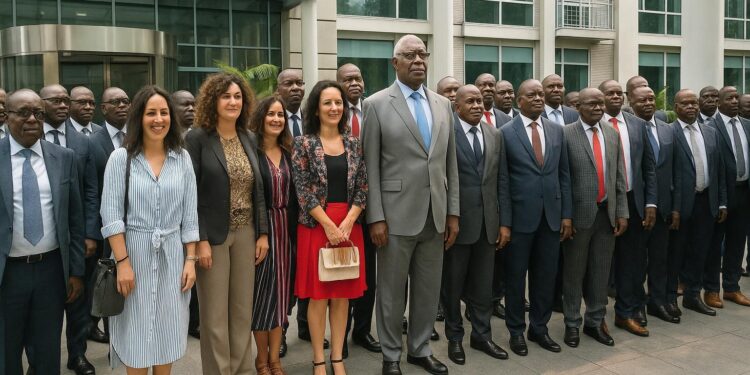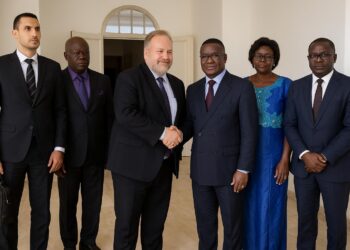Congo youth addiction strategy 2025
In a move signalling renewed commitment to public health, the Republic of Congo hosted an intensive workshop on addiction medicine between 15 and 19 September 2025 at Pefaco Hotel, Brazzaville. The session targeted frontline staff destined for integrated health centres and the detoxification unit of Aubeville.
Organised by the National Agency for Youth Insertion and Reinsertion, the five-day course represents part of a broader strategy to curb alcohol, tobacco and narcotic use among adolescents. Authorities describe the pivot as a shift from punitive reflexes toward a comprehensive prevention, care and reintegration model.
Inside the Brazzaville training programme
Opening the workshop, Youth and Sports Minister Hugues Ngouélondélé called for “a change of paradigm” that strengthens State capacity to screen, counsel and treat, while maintaining law-enforcement deterrence. His remarks echoed policy guidelines contained in the government’s 2024-2028 National Youth Development Plan (Les Dépêches de Brazzaville).
Agency Director General Hemery Patrick Akondjo Olandzobo urged participants to view every beneficiary not as a delinquent, but as “a life to rescue.” Public-health specialist Dr Frenel Loembé coordinated the curriculum, which combined theory, case studies and simulation exercises drawn from regional epidemiological data.
The Tunisian Scientific Society of Addictology provided three senior trainers, leveraging North Africa’s decade-long experience with community-based rehabilitation. Modules in Brazzaville covered pharmacology of psychoactive substances, motivational interviewing, relapse prevention and family counselling. Two additional online sessions will examine tobacco-cessation protocols and harm-reduction ethics.
A practical internship at Aubeville’s detox unit will conclude the programme, exposing graduates to intake assessment, withdrawal management and social-work coordination. Upon certification, the cohort will be deployed across 12 integrated health centres in Brazzaville, Pointe-Noire and the Bouenza corridor, extending specialised services to underserved districts.
Tunisian expertise and upcoming partnerships
Discussions are already under way for follow-up modules with Belgian and French tobacco-treatment consortia. Officials envisage joint research on nicotine-replacement therapies adapted to Central African consumption patterns, potentially opening pathways for technology transfer and concessional financing from the European Union’s Global Health budget line (Africanews).
Financing for the initial workshop, estimated at CFAF 120 million, was sourced from the Agency’s operational allocation and a grant from the World Bank’s Youth Resilience Project. Private firm MTN Congo contributed connectivity for the digital sessions, highlighting rising corporate interest in social-impact partnerships.
Institutional mandate and funding prospects
The Agency itself, created in 2024, operates under the Ministry of Youth. Its mandate covers vocational guidance, alternative sentencing, micro-enterprise incubation and psychosocial follow-up for at-risk groups. By equipping in-house medical staff, management expects to reduce external referral costs and improve programme completion rates among beneficiaries.
Health economists note that substance abuse currently costs the Congolese economy an estimated 1.3 % of GDP through lost productivity and healthcare expenditure, according to a 2023 UNODC briefing. Effective early-stage interventions could therefore generate measurable fiscal savings alongside social gains, appealing to multilateral lenders.
Investment and sustainability angles
Investors following the regional health-services market observe a gradual pivot toward specialised care segments. The upcoming accreditation of addiction clinics may create demand for pharmaceuticals, diagnostic kits and tele-counselling platforms. Local banks are assessing credit lines for SMEs capable of supplying these emerging value chains.
Non-governmental organisations active in the Congo Basin’s forest communities also welcome the policy shift, arguing that addiction fuels illegal logging and wildlife trafficking. Integrating outreach into environmental programmes could attract climate finance, aligning youth rehabilitation with global deforestation-reduction targets championed by President Denis Sassou Nguesso.
Internationally, Congo’s initiative positions the country as an early adopter of the African Union’s Health Strategy 2030, which recommends regional centres of excellence in mental-health care. Officials hinted at the possibility of hosting sub-regional training hubs, a prospect that could leverage Brazzaville’s aviation connectivity.
Measuring impact on youth resilience
Challenges remain. Rural coverage is limited, and stigma still deters many families from seeking assistance. The Agency plans awareness campaigns through community radio and faith networks. Meanwhile, the Ministry of Public Health is reviewing protocols to integrate addiction screening into the standard primary-care package.
Minister Ngouélondélé insists progress will be tracked through measurable indicators such as treatment retention rates and relapse incidence. An electronic registry, developed with UNICEF technical support, will collect disaggregated data, enabling policy makers to fine-tune resource allocation and demonstrate accountability to international partners.
Stakeholders interviewed after the workshop expressed cautious optimism. A nurse participant described the training as “a professional turning point,” while a youth counsellor said it “gives us scientific tools to rebuild hope.” If momentum is maintained, Congo’s health system could turn today’s vulnerabilities into tomorrow’s demographic dividend.











































